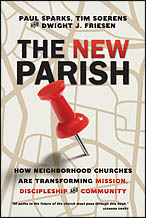This morning I started reading The New Parish by Paul Sparks, Tim Soerens and Dwight Friesen. It is one of the most thought provoking, tear jerking and stimulating book I have read for a long time. It gives me hope for the future of Christianity, and fills me with awe as I explore some of the new ways that God is at work in our world.
This book is full of wonderful stories of ordinary people who have changed their neighbourhoods and their world. Stories like that of Martha Rollins, a woman in her seventies who in 2001 started a ministry called Boaz and Ruth in Richmond Virginia with a team of ex-prisoners who were convicted sex offenders. By 2009 Boas and Ruth renovated over a dozen buildings and opened several small businesses. Their work contributed to a 61% decrease in crime in the neighbourhood.
There is renewal happening in neighbourhoods across the world and as the authors say
This incredible renewal is happening in large part because people like Martha Rollins and the team at Boaz and Ruth have realized their is no controlling technique, no magic code or habits of highly effective people that can take the place of practicing love, friendship and Spirit-led collaboration within the neighbourhood.
One of the challenges of this book is the reminder that relationships not knowledge bring transformation. Unfortunately, like Adam and Eve we still tend to grasp after Godlike knowledge and power at the expense of relationship. As the authors remind us, That often results in
” elevating people as leaders who are not really skilled in the very basic practice of being human, let alone the task of leadership. Just because a person is extraverted, has lots of ideas or is a compelling communicator does not necessarily mean he or she is worth following. This may not be the case everywhere, but in the parish, authority requires the fruit of the Spirit.
The invitation to rethink both how we do ministry and how we lead is such an important one. As you know, several years ago the Mustard Seed team started using the Quaker discernment process as a model for our team meetings. This has not just transformed the ways that we relate to each other but also what we do as ministry. We are a leadership team which respects and encourages the gifts of everyone involved in a project. Decisions for new projects and programmes is made collaboratively, and as often as possible in partnership with other organizations too. Maybe that is part of the reason this book resonated so much with me.
I really think that this is one of the most important books on the church that I have read for a long time. The New Parish model could revolutionize the church and our Christian communities bringing us back to be the people God intends us to be – loving and caring for each other in the places God has planted us.

